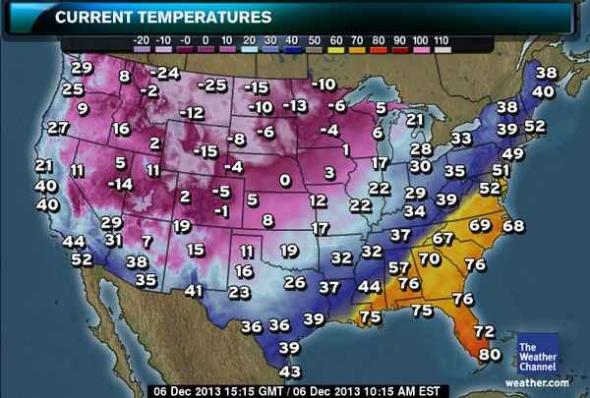I have heard that these giant snakes are making their way along the Gulf Coast from Florida. Snakes are cold-blood animals, which means they can't make their own body heat and thus their body temperature is determined by the surrounding air temperature.
Large constrictors like pythons and boas are tropical snakes that require external temperatures at least higher than the mid-70s at the lowest, and often above 80 degrees F.
As you can see by the winter weather map below, there are not many places in the U.S. that maintain those average temperatures year round.
Thus, based on this map, it is clear that large tropical constrictors cannot live year-round outside of handful of south eastern states, and thus cannot maintain permanent populations outside of these areas.
As you can see, Texas is not one of those states where they can thrive.
People keep these animals as pets in all climates (although anyone who keeps a snake longer than 8-10 feet is nuts, in my opinion), and often release them when they get too big. So that can happen in any state. But these snakes generally will die as the weather gets colder.

Great news thanks. We have enough snakes on our property already, copperheads, cotton mouths, coral snakes, maybe a small ground rattler or 2 and a variety of non poisonous snakes.
Snakes are the only creatures on earth that I actually enjoy killing. When we lived on the ranch my husband called me “the fat babe” (I wasn’t fat) after a cartoon woman who was always killing snakes.
The controlling factor would likely be the lowest winter refugia temperature to which the snake would be exposed.
Ground temperatures and now basement temperatures are likely the controlling factor.
“Snakes are cold-blood animals, which means they can’t make their own body heat and thus their body temperature is determined by the surrounding air temperature.”
Darwinian adaptation. Scientists have proven that from one celled animals to humans took only a billion years, so cold blooded to warm blooded should have taken no more than ,what, 10-12 months?
